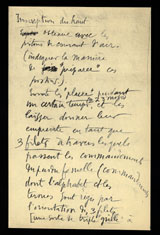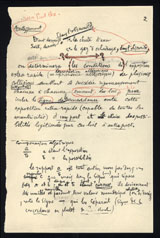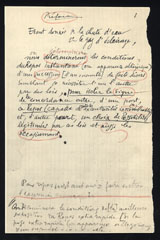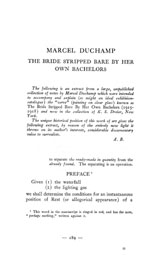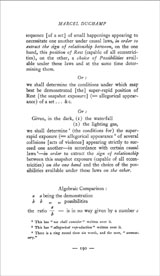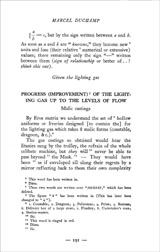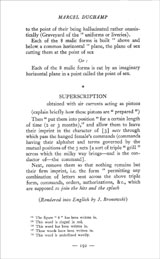Science meets Art: This Quarter and Jacob Bronowski
click to enlarge
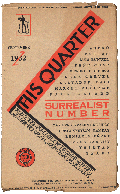
Cover for This Quarter, article
by André Breton, edited by Edward W.
Titus, Paris: The Black Manikin
Press, September 1932
This Quarter (vol. V, no. 1) of September 1932 was published and edited by Edward B. Titus. In his third year as editor for the The Black Manickin Press, he also published the memoirs of Kiki de Montparnasse and books by Anaïs Nin. This Quarter‘s “Surrealist Number” contains articles, prose and poems by important artists and writers of the movement, among them Salvador Dalí, Paul Eluard, Max Ernst, René Crevel and Tristan Tzara. Samuel Beckett also translated some of the poems. In his editorial note, Edward W. Titus describes the tremendous impact of Surrealism, however acknowledging with embarrassment the unhappiness of guest editor André Breton at having been asked to leave out “politics and such other issues not be[ing] in honeyed accord with Anglo-American censorship usages.” It is in this issue that for the first time ever, various unpublished notes by Duchamp appear, two years prior to the publication of his Green Box in 1934. Curiously enough, the chosen notes include various mentionings of the title of Duchamp’s posthumously revealed work: Given: 1. The Waterfall, 2. The Illuminating Gas (1946-1966).
With a preface by André Breton, This Quarter published these notes in English, translated by J. Bronowski. Besides a longer note titled ‘Preface’ and an ‘Algebraic Comparison,’ This Quarter contained Duchamp’s thoughts on the ‘Malic Moulds’ and the ‘Draft Pistons,’ the former being an integral part of the Large Glass‘s lower half, the domain of the Bachelors, and the latter being integral to the upper half, the domain of the Bride.
Notes by Marcel Duchamp (1911-15) which Bronowski translated from, in: This Quarter
English translation of Marcel Duchamp’s notes by J. Bronowski, in: This Quarter, edited by Edward W. Titus, Paris: The Black Manikin Press, September
1932, p.189-192
In his preface, André Breton (who published three of the same notes in the fifth issue ofSurréalisme au Service de la Révolution, May 1933) (1) calls the notes an abstract “from a large, unpublished collection […] intended to accompany and explain (as might an ideal exhibition catalogue) the ‘verre’ (painting on clear glass) known as The Bride Stripped Bare By Her Own Bachelors.” He goes on to maintain that the extract “is of considerable documentary value to surrealists.”
Richard Hamilton, who in 1960 published a typographic version of the Green Box, was somewhat dissatisfied with J. Bronowski’s first translation of and graphic attempt at the notes. “This Quarter gives translations of four separate notes though the layout does not make this clear. The translator has been at some pains to transpose the visual complication of the manuscript. “Limited to printed text, “Bronowski’s extract […] must be selective.” (2).
But who was J. Bronowski? (3)
Jacob Bronowski was born in Lodz, Poland, in 1908. Fleeing World War I, his family moved to London, where Bronowski eventually won a math scholarship to Cambridge, working in a specialized area of algebraic geometry. Between 1929 and 1942 he published his papers, bearing titles like “The Figure of Six Points in Space of Four Dimensions” (1942), in the Cambridge Philosophical Society Proceedings and other learned journals. During World War II, due to his mathematical training, he led the development of the Operational Research units for both the British Ministry of Home Security and the Joint Target Group in Washington. As head of the Chiefs of Staff Mission, he was among the first to be sent to Nagasaki to survey the damage of the atomic bomb. According to his wife, Rita Bronowski, “this was the great turning point in Bruno’s [as she refers to her late husband] life.” His three lectures given at the Massachusetts Institute of Technology in 1953 called for a responsible combination of humanistic values and scientific endeavors. After World War II he did not return to his university job but started a research laboratory for the British National Coal Board. “An early environmentalist and ecologist, he invented and developed a new kind of smokeless fuel from coal,” his wife noted. In 1963 Bronowski returned to teaching, at the Salk Institute of Biological Studies in California. His lifetime interest in cultural and anthropological evolution culminated in a highly popular 13-hour television series called The Ascent of Man.
Bronowski died in 1974, leaving behind numerous popular books like Science and Human Values (1956) and a groundbreaking study of William Blake (William Blake: A Man Without a Mask, 1944). Jacob Bronowski had a lifelong interest in literature. While still an undergraduate he started a small avant-garde magazine called Experiment. There one can find the earliest writings of William Empson, Paul Éluard, W.H. Auden and many more. Rita Bronowski remembers that “after receiving his Ph.D. and conducting three years of research, it became clear that being a Jew, Bruno would not be made a Fellow at his college (Jesus College, Cambridge). He decided to ‘drop out.’ Like so many young students (hippies, thirty years later), bearded and down-at-heel, he went to Paris to write. There he met, among others, Samuel Beckett, and they jointly edited an anthology called European Caravan (1931).” It was in Paris that Bronowski bumped into the Surrealists and together with Beckett, he helped translate the Surrealist Number of This Quarter. According to Rita Bronowski, her husband was picked to translate Duchamp’s notes since he was not only a poet but, most of all, a trained scientist.
A poet all his life, Bronowski once wrote: “The great poem and the deep theorem are new to every reader and yet are his own experience because he recreates them. They are the marks of unity in variety and in the instant when the mind seizes this for itself in art or science, the heart misses a beat.” (4). In 1939, Jacob Bronowski wrote the following and previously unpublished poem on the death of the Austrian satirist Karl Kraus (5):
-
Jacob Bronowski
The Death of Karl Kraus
Kraus died in time: before the God
he honored as his equal, who shot
Lorca, and brutally smashed
Mühsam’s delicate ears, washed
Vienna with his cleaning squads.
—
Now becomes God the anger which
Kraus spilled upon the dunged and rich
ferment Vienna. God also saw
the Danube spawn this medlar culture,
and plunged to drain it like a ditch.
—
Would Kraus to-night think it given
him as a grace, if he were driven
by boors to clean latrines? Or would
that bitter Jew pray for his God’s
forgiveness, but would not forgive? -
O yes, the age which he disowned
was easy, ageing, overblown.
Kraus prayed an age sharp as day
might etch his eyes: who, had he stayed,
would see an age like night come down,
—
and sharp and savagely blind
the poet’s eyes, and splash his mind
bloody from a knacker’s wall.
Hate and terror walk the malls.
Below the city, torture mines
—
the cellars.O Mühsam, Lorca,
I call to you across the dark
age, ere my voice too is dumb.
Give courage when the headsmen come.
Give to the desecrated God
who Kraus unleashed, once more his manhood.
Give light where only ghosts, your ghosts are.
Notes
 1. Francis M. Naumann, The Art of Making Art in the Age of Mechanical Reproduction, (Ghent, Amsterdam: Ludion Press, 1999), p. 112.
1. Francis M. Naumann, The Art of Making Art in the Age of Mechanical Reproduction, (Ghent, Amsterdam: Ludion Press, 1999), p. 112.
 2. Richard Hamilton, Collected Words, (London: Thames and Hudson, 1982), pp.184-186.
2. Richard Hamilton, Collected Words, (London: Thames and Hudson, 1982), pp.184-186.
 3. The information and quotations of this and the following paragraphs come from “Bruno: A Personal View,” by Rita Bronowski in: Leonardo (vol. 18, no. 4, 1985), pp. 223-225, and a telephone conversation with Ms. Bronowski, 4 April 2000.
3. The information and quotations of this and the following paragraphs come from “Bruno: A Personal View,” by Rita Bronowski in: Leonardo (vol. 18, no. 4, 1985), pp. 223-225, and a telephone conversation with Ms. Bronowski, 4 April 2000.
 4. Jacob Bronowski, Science and Human Values (bound with The Abacus and the Rose: A New Dialogue on Two World Systems), (New York: Harper & Row, 1960), p. 32.
4. Jacob Bronowski, Science and Human Values (bound with The Abacus and the Rose: A New Dialogue on Two World Systems), (New York: Harper & Row, 1960), p. 32.
 5. Karl Kraus (1874 – 1936) was a satirist, publisher, poet, essayist, and playwright in Vienna during a time of economic, social and political change in Austria. A member of the café bohemia, Kraus focused his acerbic sarcasm on people (including his own social set), events and the fallacies of political and social elements of turn-of-the-century Vienna. The son of a successful businessman, Kraus was financially supported by his family, which allowed him to spend six years at the University of Vienna (starting in 1892), studying law for two years before switching to philosophy and German studies. In April 1899, shortly after he left the University (without attaining a degree), he started the stinging journal Die Fackel (The Torch), which remained in existence until four months before his death. Kraus’s most noted play was Die letzten Tage der Menschheit (The Last Days of Mankind), written between 1915 and 1917, and among his many essays are “Die Demolierte Literatur” (“The Demolished Literature”) and “Sittlichkeit und Kriminalität” (“Morality and Criminality”).
5. Karl Kraus (1874 – 1936) was a satirist, publisher, poet, essayist, and playwright in Vienna during a time of economic, social and political change in Austria. A member of the café bohemia, Kraus focused his acerbic sarcasm on people (including his own social set), events and the fallacies of political and social elements of turn-of-the-century Vienna. The son of a successful businessman, Kraus was financially supported by his family, which allowed him to spend six years at the University of Vienna (starting in 1892), studying law for two years before switching to philosophy and German studies. In April 1899, shortly after he left the University (without attaining a degree), he started the stinging journal Die Fackel (The Torch), which remained in existence until four months before his death. Kraus’s most noted play was Die letzten Tage der Menschheit (The Last Days of Mankind), written between 1915 and 1917, and among his many essays are “Die Demolierte Literatur” (“The Demolished Literature”) and “Sittlichkeit und Kriminalität” (“Morality and Criminality”).
Figs. 2-5 © 2000 Succession Marcel Duchamp, ARS, N.Y./ADAGP, Paris. All rights reserved.
